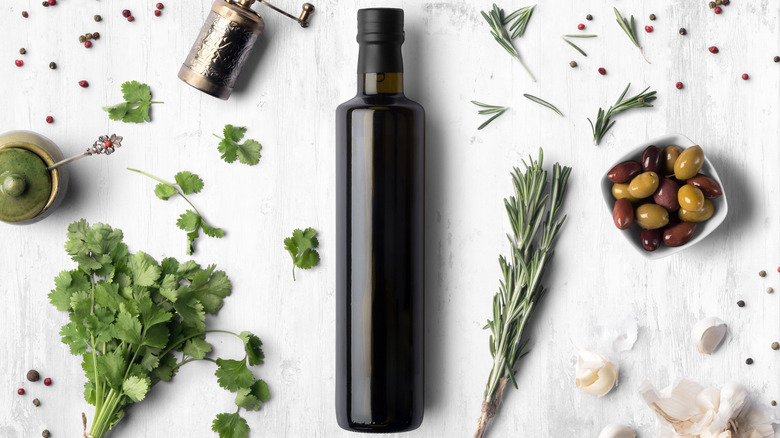Here's How To Store Your Olive Oil, According To Ina Garten
When the kitchen commandments, carved into old slabs of granite countertops, were handed down to Ina Garten from on high, they were fairly straightforward. Keep your knives sharp, stick with recipes you know, and if you're making one cake you might as well make two. That sort of thing. The masses took to their stoves, and their food processors, and their Le Creusets. And lo; it was good. Alas, it wasn't long before the masses grew restless. They traded slow cookers in for air fryers, they swapped out their cosmopolitans for Aperol spritzes. They began to watch TikTok recipes. More! they cried. Give us more! And, in her mighty goodness, the great Ina Garten obeyed.
For over 40 years now, rather than wander aimlessly through the culinary desert, the masses have been guided by the wit and wisdom of Garten. Barefoot Contessa, the specialty shop she ran in the Hamptons (before making it big on Food Network and founding an empire of the same name), was purchased by Garten 43 years ago this month, and Garten credits the tiny kitchen store for kickstarting a career in food that has spanned multiple television shows, 12 cookbooks, and countless chicken parms (via People).
Her bubbly persona and the meticulous testing and recreating of every recipe she writes have earned her the people's trust. So when Garten tells you how to store your oils and vinegars — oil tell you now — olive you better listen carefully.
Avoid light, heat, and oxygen
"You can store both of them in the pantry," Garten decrees, via the "Ask Ina" section on her website. "But I store olive oil in the pantry and vinegars in the refrigerator to extend their life." Thus was answered the question posited by Dana Koegel from Miltona, Minnesota, and an entire cooking culture exhaled, relieved. Yea, verily, the great almighty Garten does store her olive oil in the pantry, just as we mere mortals do, and nary a chef has been smote thus far.
Olive oil faces three mighty foes in its quest to bring you shimmering hot pans and a drizzly, balanced bruschetta: light, heat, and oxygen. Storing your olive oil in the pantry will keep the liquid gold at room temperature, protecting it from too much light or heat. Make sure you keep your bottle capped when it's not in use to avoid unnecessary contact with air, and your olive oil should be good to go.
Epicurious goes even further, suggesting that cooks use or toss their olive oil within a month of purchase. Like a bottle of wine, olive oil begins to change (in color and in flavor) from the moment it first interacts with oxygen, so once you've opened that bottle, the clock begins. Both websites recommend dark glass or ceramic bottles for storing your olive oil, to protect it from the elements just that little bit more. And as soon as we have that confirmed by Garten herself, we'll hit "submit" on our Amazon order.

